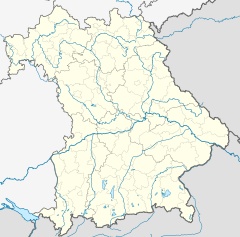Veitshöchheim station
| Through station | |||||||||||
 King's wing of Veitshöchheim station, on the right part of the covered walkway | |||||||||||
| General information | |||||||||||
| Location | Bahnhofstraße 11, Veitshöchheim, Bavaria Germany | ||||||||||
| Coordinates | 49°49′50″N 9°52′34″E / 49.83056°N 9.87611°E | ||||||||||
| Owned by | Deutsche Bahn | ||||||||||
| Operated by | DB Station&Service | ||||||||||
| Line(s) |
| ||||||||||
| Platforms | 2 | ||||||||||
| Other information | |||||||||||
| Station code | 6403[1] | ||||||||||
| DS100 code | NVE[1] | ||||||||||
| IBNR | 8006065 | ||||||||||
| Category | 6[2] | ||||||||||
| Fare zone | VVM: A/221[3] | ||||||||||
| Website | |||||||||||
| History | |||||||||||
| Opened | 1 October 1854 | ||||||||||
| Passengers | |||||||||||
| < 500 [4] (2006) | |||||||||||
| Services | |||||||||||
| |||||||||||
| |||||||||||
Veitshöchheim station is a regional railway station in southern Germany. It is at kilometre marker 7.0 on the Main-Spessart Railway from Würzburg to Aschaffenburg. It was built during the construction of Ludwig's Western Railway, which was taken fully into service on 1 October 1854.
The station was built in the immediate vicinity of Schloss Veitshöchheim, a summer residenz initially of the prince bishops of Würzburg, later the kings of Bavaria, at Veitshöchheim near Würzburg. The castle is especially well known for its surrounding rococo garden.
In the 19th century this park, which was then a public facility, was nearly destroyed by the construction of the railway. Engineers had planned to use the central avenue of the park for the trackbed of the railway.[5] This idea was however vetoed by King Ludwig I, who ordered the line to be routed to the east around the castle gardens even though this was topographically less suited.
This was also where Veitshöchheim station came to be built. It was given a station building which was particularly representative of a spa town and which was to required to serve both as an excursion station for Würzburg's citizens visiting the park as well as acting as the station for the royal castle. The public station building was much larger than was warranted for Veitshöchheim which was only a village at the time. Next to this building a royal pavilion (Königspavillon) was built directly on the main axis of the castle acting as a private railway station. This was connected to the station building by a covered hallway. The royal pavilion is used today by the municipal library and by Veitshöchheim's youth hostel.
Between 2004 and 2005 the platforms at the station underwent extensive modernisation. For a total of €3.2 million, two new prefabricated outer platforms were built, which were sited a platform length towards the direction of Würzburg. A new underpass was built to act as access for the platforms. The old home and intermediate platforms were removed following the completion of the new ones in July 2005.[6]
Services
[edit]| Train class | Route | Frequency |
|---|---|---|
| RB 53 | (Schlüchtern – Jossa –) Gemünden (Main) – Karlstadt – Veitshöchheim – Würzburg – Schweinfurt (– Bamberg) | Hourly + individual trains in the peak between Karlstadt and Würzburg continue as RE 10 to Nuremberg |
| RE 54 | Frankfurt – Maintal – Hanau – Aschaffenburg – Gemünden – Veitshöchheim – Würzburg | 2 pairs of trains, all stops |
| RE 55 | Frankfurt – Offenbach – Hanau – Aschaffenburg – Gemünden – Veitshöchheim – Würzburg | 2 pairs of trains, all stops |
| RB 79 | Aschaffenburg – Gemünden – Würzburg | 1 pair of trains, all stops |
| As of 12 December 2021 | ||
References
[edit]- ^ a b Eisenbahnatlas Deutschland (German railway atlas) (2009/2010 ed.). Schweers + Wall. 2009. ISBN 978-3-89494-139-0.
- ^ "Stationspreisliste 2025" [Station price list 2025] (PDF) (in German). DB Station&Service. 28 November 2024. Retrieved 5 December 2024.
- ^ "Wabenplan des VVM" (PDF). Verkehrsverbund Mainfranken. 1 August 2020. Retrieved 16 March 2021.
- ^ "Brochure: Personenbahnhöfe in Bayern" (PDF; 7.4 MB) (in German). Deutsche Bahn. Retrieved 16 April 2013.[permanent dead link]
- ^ Eckhart Rüsch: Der Bahnhof Veitshöchheim, in Jahrbuch für Eisenbahngeschichte 24 (1992), S. 23ff
- ^ KBS 800 Aschaffenburg - Würzburg, in Bahn-Report 3/2005, S. 71



